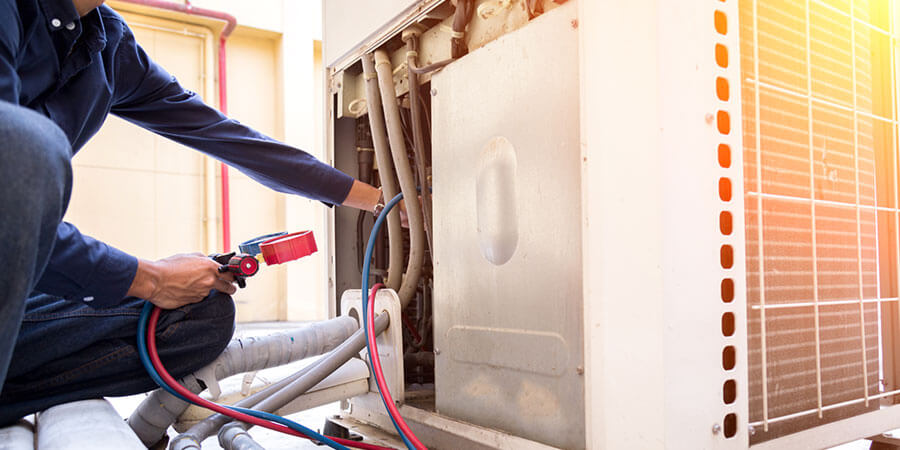Solve Heating Issues Efficiently with DMAKS HVAC Repairs.
Solve Heating Issues Efficiently with DMAKS HVAC Repairs.
Blog Article
Energy-Efficient HVAC Equipments to Minimize Utility Expenses
As energy prices remain to increase, the importance of energy-efficient cooling and heating systems becomes progressively evident. These systems not only assure substantial cost savings on utility bills but also add to an extra sustainable future by lessening energy intake. With numerous alternatives readily available, consisting of geothermal heatpump and ductless mini-splits, homeowner encounter a plethora of options that can enhance convenience and air top quality. Comprehending the key attributes and upkeep requirements is crucial to making best use of these advantages. What factors should be prioritized when selecting the right system for your demands?
Benefits of Energy-Efficient HVAC Equipments
Energy-efficient A/c systems use numerous advantages that extend past plain expense financial savings. By taking in much less energy, these systems add to lower greenhouse gas exhausts, assisting to combat environment change and promote sustainability.
Additionally, energy-efficient heating and cooling systems usually supply enhanced comfort levels. A lot of these systems include innovative technology that permits much better temperature level control and boosted air quality (DMAKS HVAC). This leads to a healthier indoor setting, which is particularly essential for individuals with allergies or breathing problems
Furthermore, buying energy-efficient a/c systems can improve home worth. As even more consumers focus on power performance, homes and buildings furnished with these systems may attract higher bids in the property market.
Types of Energy-Efficient A/c Options
Exactly how can house owners and organizations pick the most appropriate energy-efficient HVAC choices for their requirements? The market supplies a range of energy-efficient cooling and heating systems, each designed to boost comfort while decreasing energy usage.
One option is the variable refrigerant circulation (VRF) system, which successfully controls the temperature in several areas within a structure. This system adjusts its cooling agent circulation to match the preferred temperature level, causing substantial energy financial savings.
An additional prominent selection is geothermal warm pumps, which make use of the planet's stable temperature level to warm and trendy spaces. By transferring heat to and from the ground, these systems demonstrate outstanding efficiency, specifically in modest climates.
Furthermore, ductless mini-split systems provide an energy-efficient option for homes lacking ductwork. These systems permit zone-specific heating & cooling, decreasing power waste in unoccupied locations.
Last but not least, high-efficiency heaters and a/c unit, with advanced SEER and AFUE ratings, offer reputable climate control while consuming less energy than typical designs. By reviewing these options, homeowners and organizations can select an a/c system customized to their details needs and power efficiency goals.
Trick Features to Take Into Consideration

Next, investigate the kind of compressor made use of in the system. DMAKS HVAC. Variable-speed compressors can change their output to match the home heating or cooling down demand, causing boosted convenience and power cost savings compared to single-speed models. In addition, seek systems equipped with clever thermostats that supply programmable setups and remote access, permitting for far better control over energy intake
An additional vital attribute is the system's air filtration capability. High-efficiency filters can boost indoor air high quality and reduce energy usage by making certain the system runs effectively. Take into consideration the type of refrigerant used; contemporary systems usually employ environment-friendly refrigerants that have a lower ecological effect.
Last but not least, ensure that the system is compatible with zoning modern technology, which allows for tailored temperature level control in various locations of your home, enhancing convenience while lessening power usage.
Tips for Choosing the Right System


Following, think about power performance rankings, particularly the Seasonal Power Effectiveness Proportion (SEER) for cooling systems and the Yearly Gas Usage Effectiveness (AFUE) for furnace. Greater ratings indicate higher performance, which can bring about significant financial savings on utility bills gradually.
In addition, review the type of HVAC system that ideal suits your way of living and budget. Alternatives consist of central air, ductless mini-splits, and heatpump, each with its own set of benefits and downsides.
Do not ignore the significance of proper installment and sizing; an improperly sized system can bring about inefficiencies and enhanced wear. Finally, seek advice from with an expert heating and cooling professional to acquire experienced referrals customized to your home's one-of-a-kind demands. This extensive technique will certainly make certain that you pick an energy-efficient heating and cooling system navigate here that meets your needs and budget efficiently.
Maintenance for Optimal Performance
When the appropriate a/c system is in place, continuous upkeep becomes essential to guaranteeing optimum efficiency and longevity. A well-maintained system runs a lot more effectively, leading to lower power usage and minimized utility costs. Normal examinations and tune-ups should be set up a minimum of two times a year-- when prior to the air conditioning period and when prior to the home heating season.

Home owners need to also be cautious concerning checking their a/c system's efficiency. Uncommon noises, fluctuating temperature levels, or raised power costs can suggest underlying problems that call for prompt interest. By attending to these problems promptly, property owners can prevent costly repair work and extend the lifespan of their systems.
Spending in an upkeep strategy with a certified service technician not just improves effectiveness yet additionally supplies assurance, recognizing that the system is operating at its ideal. DMAKS HVAC. Regular maintenance is as a result essential for maintaining energy effectiveness and minimizing general operational prices
Conclusion
Finally, energy-efficient a/c systems present a feasible remedy for decreasing energy expenses while boosting comfort and air the original source high quality. By including innovative modern technologies and choices such as geothermal heatpump and ductless mini-splits, homeowner can attain substantial power financial savings and add to ecological sustainability. Mindful consideration of system features and recurring upkeep further makes certain optimum efficiency, making energy-efficient systems a prudent financial investment for both financial and environmental benefits.
Report this page